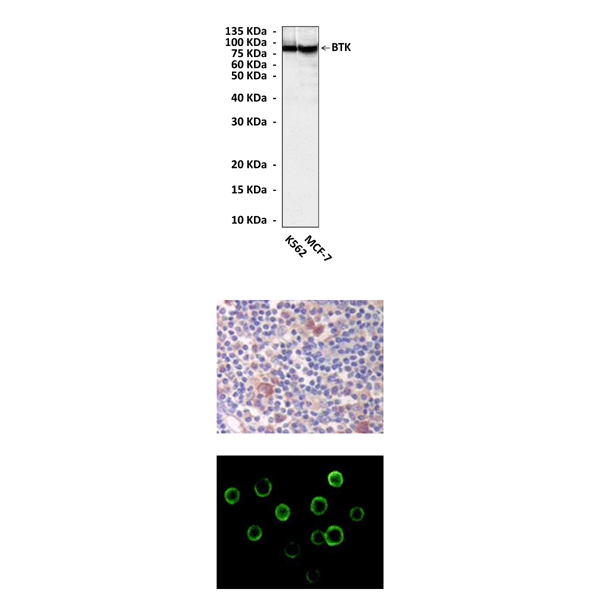Anti-BTK: Mouse Bruton's Tyrosine Kinase Antibody |
 |
BACKGROUND Bruton's Tyrosine Kinase (BTK) is member of the Tec family that is critically important for the growth, differentiation and activation of myeloid-, mast- and B-cells.1 BTK is activated firstly by membrane localization stimulated by PIP3 generation, and subsequently, by transphosphorylation of Tyr-551 by Src family kinases. Further activation occurs within the SH3 domain via a transphosphorylation mechanism. Tyr223 in this domain was phosphorylated by c-Abl.2 Activated BTK is involved in the phosphorylation of a number of signaling molecules involved in the PLCgamma, JNK and p38 MAPK pathways, leading to Ca2+ mobilization, mRNA stabilization and the induction of NF-kappaB and AP-1 transcription factors.3 BTK activity is negatively regulated by a number of proteins including inhibitor of BTK (IBTK), Sab and c-Cbl. Mutations in this enzyme are known in humans and result in the immunological disorder X-linked agammaglobulemia.4
REFERENCES
1. Mohamed, A.J. et al: Immunol. Rev. 228:58-73, 2009
2. Backesjo, C.M. et al: Biochem. Biophy. Res. Commun. 299:510-5, 2002
3. Kurosaki, T & Hikida, M.: Immunol. Rev. 228:132-48, 2009
4. Toth, B. et al: Mol. Immunol. 46:2140-6, 2009
2. Backesjo, C.M. et al: Biochem. Biophy. Res. Commun. 299:510-5, 2002
3. Kurosaki, T & Hikida, M.: Immunol. Rev. 228:132-48, 2009
4. Toth, B. et al: Mol. Immunol. 46:2140-6, 2009
Products are for research use only. They are not intended for human, animal, or diagnostic applications.
Параметры
Cat.No.: | CP10029 |
Antigen: | Purified recombinant human BTK protein fragments expressed in E. coli. |
Isotype: | Mouse IgG1 |
Species & predicted species cross- reactivity ( ): | Human, Monkey |
Applications & Suggested starting dilutions:* | WB 1:500 - 1:2000 IP n/d IHC 1:200 ICC 1:200 FACS n/d |
Predicted Molecular Weight of protein: | 77 kDa |
Specificity/Sensitivity: | Detects endogenous BTK proteins in normal cell lysates without cross-reactivity with other family members. |
Storage: | Store at -20°C, 4°C for frequent use. Avoid repeated freeze-thaw cycles. |
*Optimal working dilutions must be determined by end user.
Документы
Информация представлена исключительно в ознакомительных целях и ни при каких условиях не является публичной офертой








